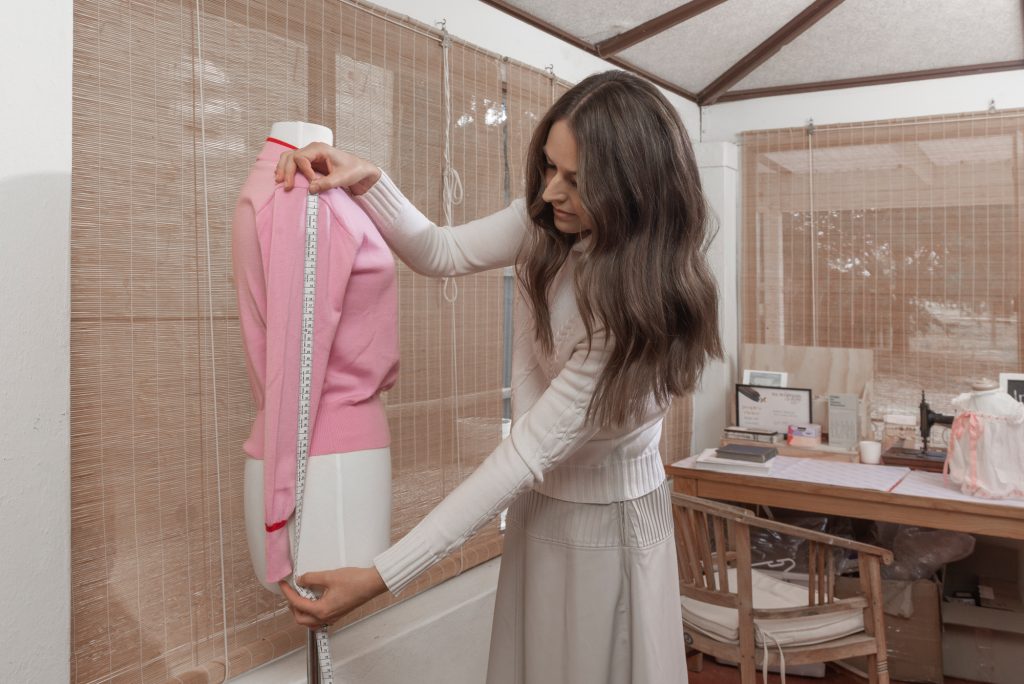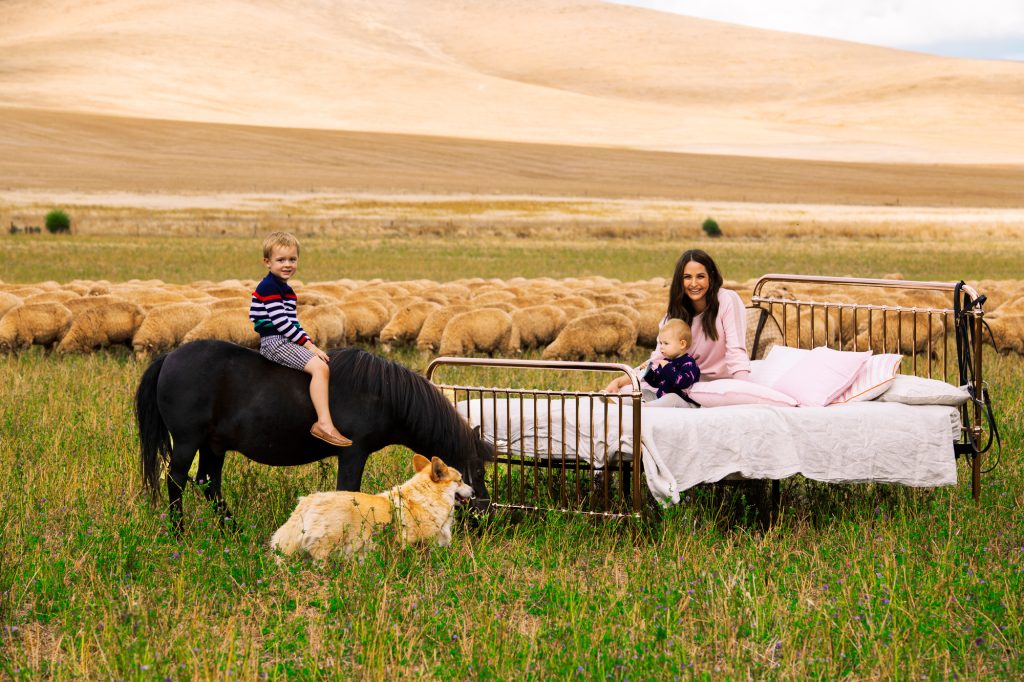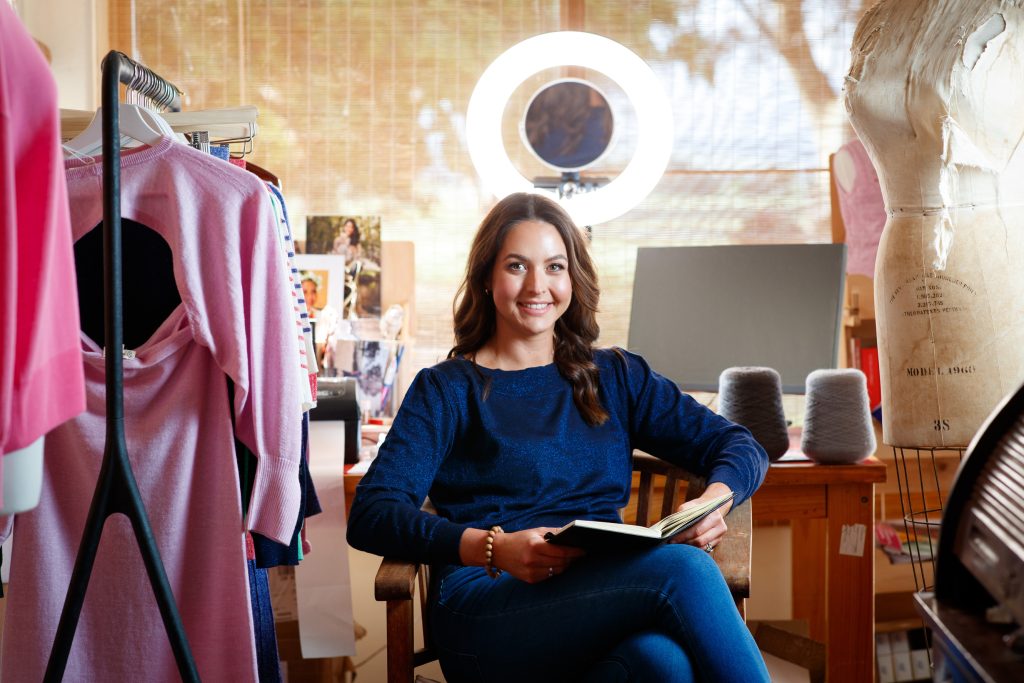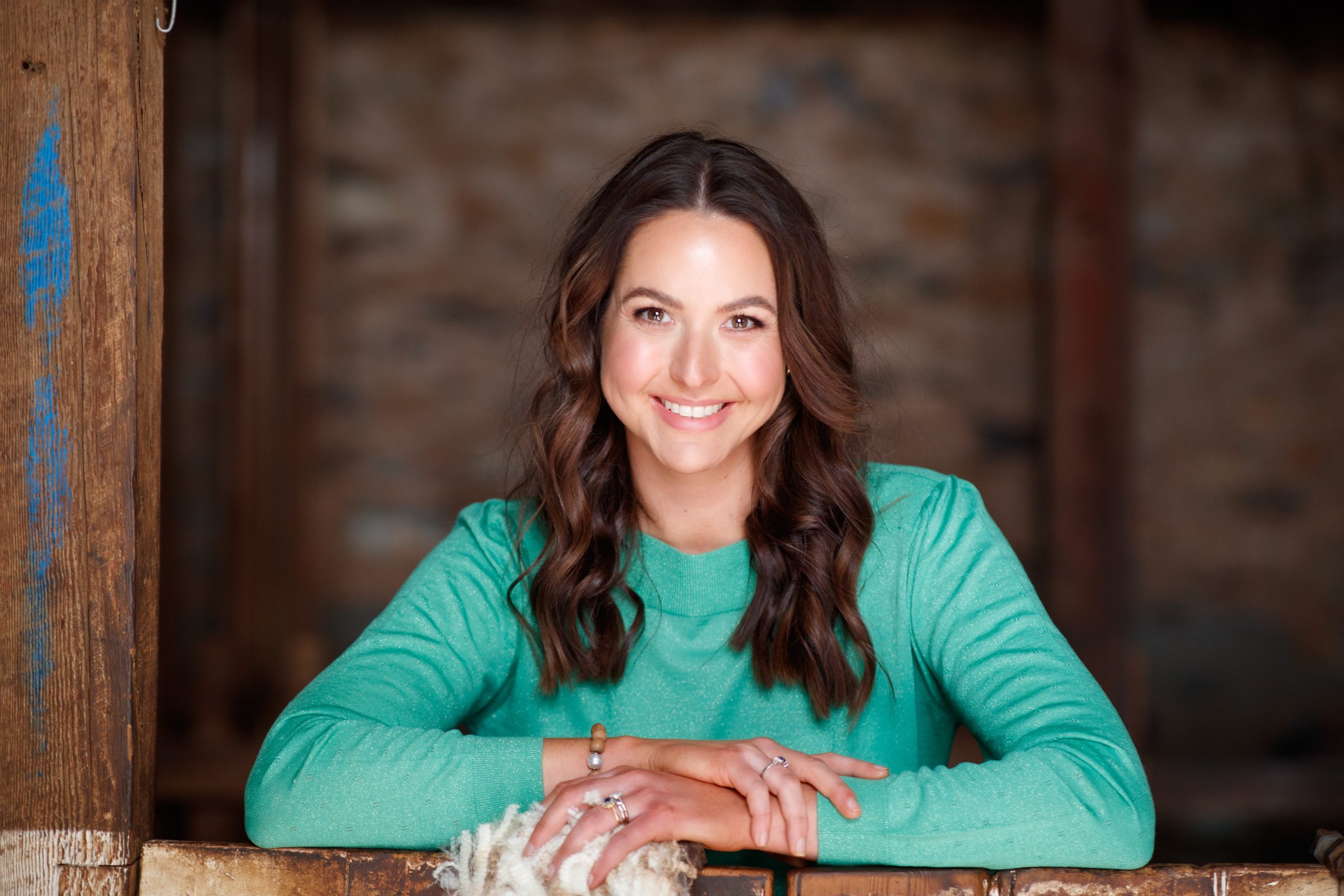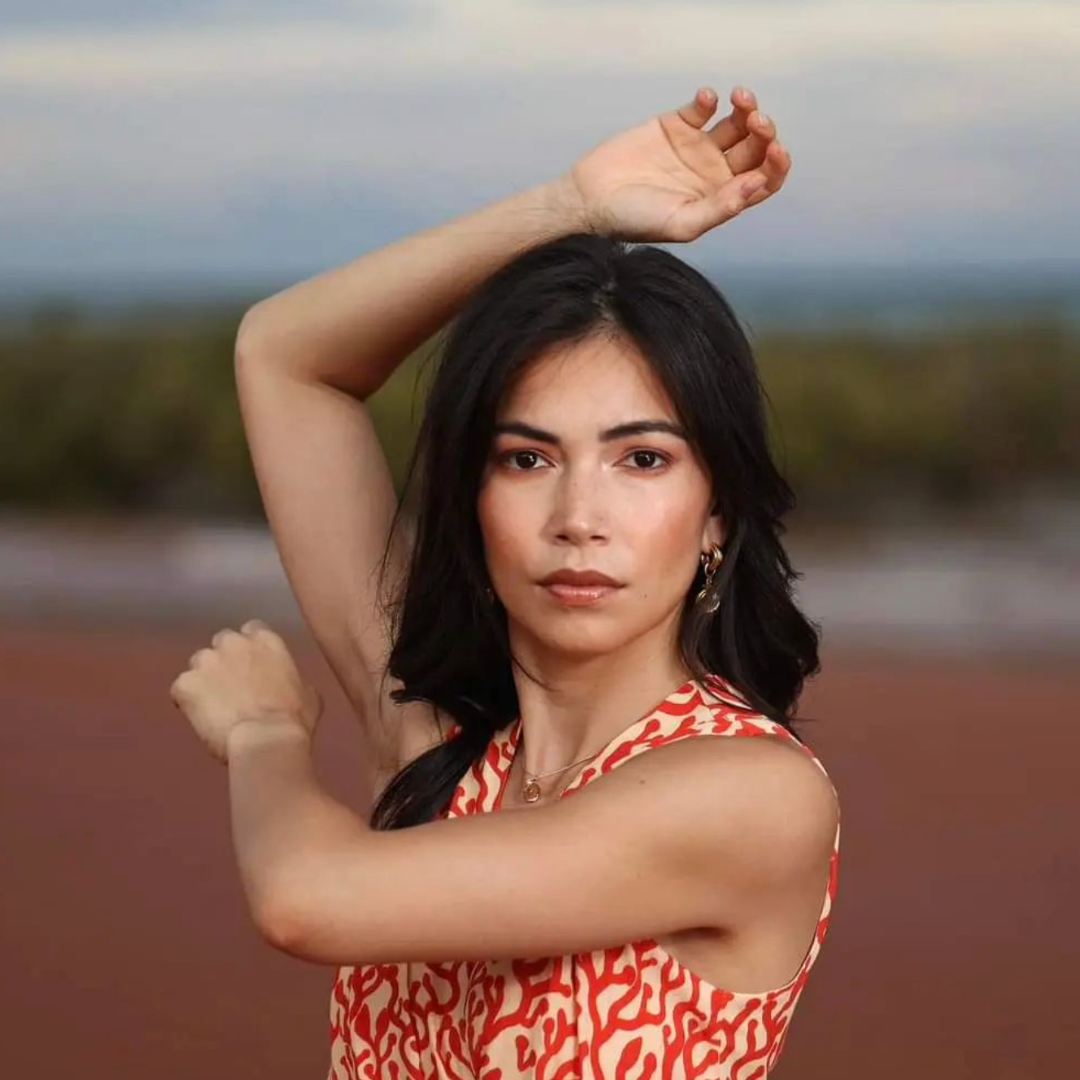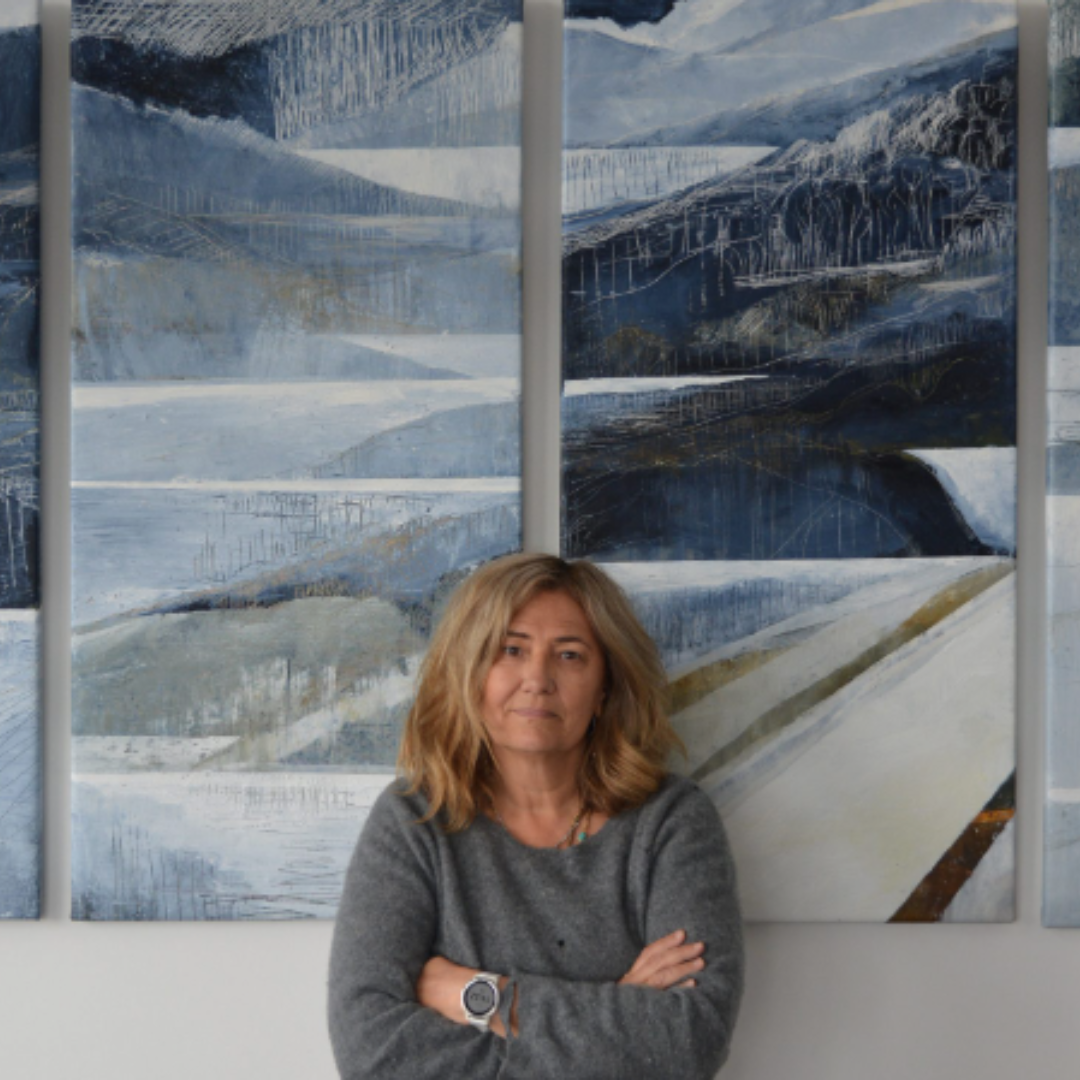Bec Bignell: [00:00:00] Aussies are relocating from capital cities to regional Australia in record numbers. We could give you all the stats about better house prices, all the jobs on offer, and higher levels of happiness. But what’s better than hearing from someone who’s made the move themselves? Welcome to You Moved Where?
The podcast, where we interview everyday Aussies who have moved from the city to the country. I’m. Bec Bignell, a girl from Regional Australia who moved to the city and then you guessed it back to regional Australia. This is You Moved Where?!
Do you ever think about how the clothes on your back went from imagined idea to arriving in your mailbox? If you happen to own an Ian Woo garment, chances are that the story of a very talented woman designing glamorous [00:01:00] collections from a dusty working farm will find its way from the hangar into your heart.
Emily Riggs doesn’t just make clothes, she makes magic. Weaving her special story into the very fibre of her. Which have made their way into wardrobes all over the world. Emily’s wisdom, grit, and resolve from childhood trauma has spurred her through life, uprooting her from fashion obsessed suburban Melbourne, where she was working as a high powered marketing professional to the laid back bush life in Burra.
In pursuit of love, the startup business Superwoman has covered countless kilometers. To take her label from the back paddocks of a sheep station to the front windows up, top end boutiques, all the while raising two kids and working on an operational farming enterprise in a rural community. In Emily fashion, she takes it all in her stride and she reckons that moving to the sticks doesn’t inhibit your dreams.[00:02:00]
It sets them in motion.
Emily Riggs, you moved where?
Emily Riggs: I moved to Burra in South Australia. And where did you move from?, I was actually living in Melbourne, uh, Victoria. So it was a big, big change, um, moving to a small town of Burra, but the best thing I’ve ever done. What took you to
Bec Bignell: Melbourne?
Emily Riggs: I did, uh, I went to uh, mark Solden College, which is in Geelong, Victoria, and I did a horse business management course and I actually, after.
I finished that. I went to New Zealand, worked there, and all in the thoroughbred racing industry. And then I actually got a job in, uh, new South Wales, uh, um, in a, at a thoroughbred stud again. And then I was offered a job at Moony Valley Racing Club in the marketing department there.
Bec Bignell: And what did you love about [00:03:00] city
Emily Riggs: life when you lived?
I think probably just the access to so many things you take for granted out in the country now. Um, just easy to get to the shops, easy to, uh, get food. Um, there wasn’t Uber, I suppose back then, but we could get takeaway and , um, taxis. Yeah, just those things you take for granted living in the. You
Bec Bignell: met your future husband, Tom, how did that happen?
Emily Riggs:
So we actually knew each other at boarding school. Um, we had this little spark, um, but nothing ever eventuated. And then, um, about 10 years on, I was at a race meeting in Melbourne. Um, I glammed up and he was scrolling Facebook and um, the photo must have stopped his tracks. And then he messaged me and I.
Messaged back said, oh, I’m coming back to Adelaide next weekend. Um, do you wanna catch up ? So he came up to Adelaide and we caught [00:04:00] up and the rest is history. So, yeah. So
Bec Bignell: you’ve fallen for this guy who’s a fifth generation sheep farmer. , was there any hard discussions about where you would live, like city or country, and was that a deal breaker for you?
How did you feel about that?
Emily Riggs: No. Funny. I’ve always thought I would marry a farm or, or live on a, or live on a farm. Um, ever since I was little, I suppose mum grew up on a farm, so I had that. Um, in my blood I loved, and I grew up in the regions. Um, so yeah, I just thought I would marry a farmer and I didn’t know it would be Tom, but it wasn’t a shock to my shock to my system really.
I, um, I, there was no question, of course, I, I thought I just, just moved up here, I suppose. Um, . Yeah. A lot of my friends are like, cuz when I first started dating Tom, he was living on one of our stations, which is like, like everyone thinks it’s in the middle of nowhere, but it’s really not. It’s only half an hour from bar.
But they’re like, what were you thinking when you were going out there visiting him? I was like, well, I didn’t [00:05:00] really think about it, I just did it. Yeah. . It was fine with my, um, so yeah, it’s funny people’s perceptions, but I was, um, very comfortable and ready to.
Bec Bignell: Was there anything that you had to learn once you did make that jump to living on the farm, you know, permanently?
Were there any things that you needed to know? , you know, and get your head around in regard to the way that that operation works or how you fit into it.
Emily Riggs: Yeah, I suppose I had a bit of a fairytale vision of what farm life would be, I’d just obviously gone to my grandparents’ farm and just like helped.
Didn’t really help out. I got to ride horses and um, just all those fun kind of things. But then, yeah, I didn’t. How hard they work and, um, what they actually have to go through. They have to, um, mother nature controls, controls at a fair bit and they have to deal with droughts. And yeah, we probably two or three years into me moving up [00:06:00] here, we hit the, like worst drought on history and, um, just to watch that was pretty devastating for not only my husband but my father-in-law who’d, um, worked.
this land all his life and he’d never experienced anything like it. So yeah, I definitely had this idea of what it would be like, but it’s reality. Yeah, it’s a lot different , but it is, um, such a fabulous, uh, place to be living and bringing up. We’ve now got two kids. Um, yeah, so very lucky
Bec Bignell: And I suppose, you know, every farm has its own unique specialization.
Like in your case it was wool or it is wool. As someone who’s grown up on a, a sheep farm, I know that sheep have a very, you know, there’s a knowledge that you need to know about them. Like, for example, when we bring people down and try and get them into some sheep work, and they always stand in front of the mob, , no, they’re not gonna move.
Like all of the, the things that you pick up, I guess it’s much like. With horses, you know, there’s a [00:07:00] particular language for the particular animal. How did you get your head around everything sort of sheep related, especially given the business that you go on to create focuses on wool? What was that like for you to learn about sheep and wool?
Emily Riggs: Yeah, I, I suppose, as you said, with the horses, I sort of had an understanding like, yeah, you don’t stand in front of them, in front of them if you want them to go through a gate. Um, And I always watch my uncles and that work with sheep and I know how frustrating they can be, um, . So I’m definitely not a natural with them.
I’m bit uncle, like I’m not a coordinated person, . So, but um, yes, the more you work with them, the easier it gets. And I sort of have an idea of what I’m doing, but I. . I wouldn’t be able to go out and drench a whole he whole mo mob of shape myself, or I reckon you would cause you can do anything.
Bec Bignell: [00:08:00] But I also think it’s really special that you have such a direct relationship with the animals themselves, because obviously wool is the foundation of the business that you went on to create.
Tell me about fashion you first felt a buzz for fashion when you were 10 years old. Why at this age does it, did it resonate with you?
Emily Riggs: Yeah. Um, I was actually diagnosed with non-Hodgkin’s lymphoma, which is a cancer of the lymph nodes. And at that same time, mum was in the battle of her life with breast cancer, um, , um, oh, the amount of times I say it, I still cry.
Sorry, . . And so I knew I, when the doctor walked in, I knew what he was saying when he said, oh, Emily’s got not Hodgkin’s Lymphoma. And the first thing I said was, oh no, I don’t wanna lose my hair as a almost 10 year old does . [00:09:00] Um, yeah, A year into my treatment, mum. I actually lost her battle. She was only 43. I was, um, oh yeah, I did.
I ended up, I did lose my hair and a lot of, um, people just assumed I was a boy cuz of the short hair and. , um, in all these gorky clothes, , and then I, and wearing a cap or whatever, and I just looked like a boy. And then I suppose that was when I turned to fashion and I, I loved dressing up and um, kind of was a, I suppose a shield to what I was actually going through.
And, um, yeah, so looking back then was probably when. First seeds of my business, Aris and wool were planted. And then, uh, fast forward 20 odd years, I marry my hot farmer husband, who’s a Marino sheep producer. And I fell in love with wool as well. And it’s an beautiful, natural, renewable, biodegradable fiber that, um, [00:10:00] yeah, it’s incredibly credible that it’s grown off the sheep’s back.
Uh, and then you can turn that into a jumper. And so I just. Ignorance is bliss. That why not create iris and wool. And here we are in my fifth year of business and it’s been such a rewarding journey so far. Your story is
Bec Bignell: so powerful because the tragedy that you’ve had to walk through and your resilience and strength, obviously resilience is quite an overused word, but I think just as someone who watches.
and admires what you’ve achieved. Um, I have a very sincere understanding and respect, especially having become a mother and, um, and business itself is a really challenging thing to have to, um, you know, get into an approach and you, no one really can give you the rule [00:11:00] book on what it’s like to manage your own business.
You. Started Iris and Wool and it’s really boomed over the years it’s been supported by some amazing organizations like Buy From the Bush and online platform that highlights, you know, amazing products and businesses in the Bush. How has the regional business community supported you?
Emily Riggs: Oh, it’s actually been incredible really, um, by, from the Bush.
I was lucky to be featured when they first started in, and it was my first year of business, so I got access to a lot of, uh, cus a customer base that I wouldn’t have. if they weren’t around. And yeah, gave me media attention and got to go to Sydney and sell to all the city people in Sydney. And yeah, I’m, I’ll be forever in debt to them.
Um, and then the, the Grae, her community who’s a. Fabulous. Um, magazine, they, um, have featured me a lot and supported me the rural room. Have that like you were very [00:12:00] supportive of my when I was beginning iris and wool, so thank you. And just the wool growing community I think really love what I’m trying to do.
They can, they can, I suppose they can relate to me cuz. , I’m on a farm, I’m married to a farmer and I’m trying to do the best I can to promote the fabulous qualities of Australian Marino wool. Um, like I’m actually. Heading over to Western Australia on Friday to the Darkened Sheep Fest. Yeah. . Yes. Um, so I’m speaking at that, which is an incredible opportunity and very grateful.
It’s just, I think the wool producer, all the wool growers, um, uh, have been fabulous. I can’t thank them enough and I think I’m, I’m Hopi. Hopefully I’m doing them proud. And um, yeah, getting the fiber out there, out to the masses and showing that farmers actually do care for the animals. You know,
Bec Bignell: you wear so many hats.
[00:13:00] You’re not only. orchestrating all of the fundamentals of the business, the design, the creativity, the logistics. But you are also the face of the business. So you are telling the story, you are speaking, you’re going to so many different events. How do you manage all of those different things, especially being a mom as well.
I’m personally very interested In how you managed to do it all?
Emily Riggs: Yeah, the, the juggle is real. Um, my house is always a pig star, , so I’m not, and I’m not the most organized person, but I don’t know, you just kind of, it just gets done, I suppose. And I try and take every opportunity that. comes my way and I have a very supportive husband and in-laws, they pick up the slack with the kids.
And we are lucky here. We’ve all, my sons just started school this year. Um, and then my daughter, we have daycare, um, or rural care, it’s called here. Um, so my daughter goes there three days a week [00:14:00] and I’ve actually just employed someone two days a week. So, um, I’m feeling like the weight’s lifting a. The shoulders and I’ll be able to get out there more and I still get mum guilt.
You know, I just feel guilty away being away a fair bit. Um, I am tired, , but um, it’s just so rewarding what I do. I don’t feel like it’s a job. Very grateful. I can do what I can do. But yeah, it’s not as glamorous as it my look. , um, starting a small business in the region. is in itself like a huge achievement, I suppose.
Bec Bignell:
Tom obviously runs an enterprise with his family, so you would’ve had access to watching that happen, but where did the inspiration come from to start the business? ?
Emily Riggs: Yeah, good question. Um, I just wanted to do something for myself, I suppose. And, um, I, um, I just had belief in myself, I suppose, and I have had good, a good support system around [00:15:00] me.
Um, good mentors and it’s, yeah, it’s just, I suppose you just, there are mistakes you make, but you learn along the way and, um, Really believe in what I’m trying to achieve. Hope I’m, hope I’m going for many years to come. Grace, the producer and I were also talking and we were sort of having a look at everything online.
Bec Bignell:
Your products are just incredible and I can attest to the quality because we have some that feature in homespun that Heather Mitchell and Claire Vander wear, and they. Come up so beautifully. It’s not just a fashion label. You’ve got incredible taste. So you are on trend. You’re keeping up with the fashion, um, that’s happening kind of globally.
Tell me how you kind of participate in the fashion world from where you are in Burra.
Emily Riggs: Oh, I, um, I try and travel around a bit to, uh, different events and do popups and um, I suppose with the online, [00:16:00] With online, with the internet, it’s easier to, um, showcase and get, get your name out there. And with social media it’s easy.
And I suppose I’ve. Kept my followers. I’ve shown like all, all my, um, rawness as well, so I, I feel like I’m more than just a fashion brand. I’m a lifestyle brand. I suppose. I, um, share my story with them and I feel like they feel that they can speak to me. I do all the social media, so it’s me speaking. It’s my way of, I suppose it’s my unique point of difference compared to all my competitors.
I can, so that I think, I believe that’s how I’ve been able to grow and cut through what is really a saturated market. But you can’t just sit behind the screen. You have to get yourself out there. And public speaking used to be like my worst nightmare, but now I actually quite enjoy it. . So, so it’s, its true.
The more you do it, the easier it gets and.
Bec Bignell: And I [00:17:00] think you’re so generous in sharing your story because having that visibility and having that access to someone like you who is being really vulnerable, is really helpful for people who are going through similar experience. And also, like you say, it gives a very personal quality to the story.
Um, your business name has a very special connection. Can you please tell me where does Iris all come?
Emily Riggs: The iris was mum’s favorite flower. So, uh, that’s why I’ve used Iris. And then the wall is obviously for the wall and just makes it obvious that it’s Marino. Well, doesn’t make, obviously it’s Marino wall, but it’s, um, just a nod to the fiber.
Um, yeah, and we also have donated to the McGrath Foundation in honor of. also donating. I’ve made these little children’s beanies and I’m donating them to, um, all the newly di cancer diagnosed children in South Australia [00:18:00] to a charity called the, um, childhood Cancer Association. Um, they create hospital bags that they give to all the new families that have been diagnosed, and they’re gonna pop my beanie in those hospital bags.
And then I’m also gonna donate a dollar from each sale to them as well.
Bec Bignell: I think it’s really. Incredible that you’ve built community around the brand as well. So it’s not just, like you say, a fashion label. There is all these different links and connections and people that are involved in the whole world of iris and wool, and that’s, you know, remarkable because I feel like that’s probably a bit of a point of difference in the world of fashion.
What did it feel like the very first time that you saw someone wearing your clothes when you were out in the wild?
Emily Riggs: I still have to pinch myself when I say someone out. Yeah, I’ve seen, I had a doctor or my husband did something, or Tom did
something to his shoulder when he was playing footy, and this was a couple of years ago.[00:19:00]
We had to take him to the Adelaide, to the hospital there to the doctor, and. . I was wearing one of my jumpers, and as soon as she walked in, well as soon as I walked in, she said to me, are you wearing some iris and wool? Is that some lovely Ian wool? I was like, yes, I am Iris and Wolf . Um, and then last year I was just like randomly driving in Adelaide.
Side Street somewhere, and there was someone literally just walking on the side of the road in Iris and war. I was like, oh my God. . Yeah. So that was pretty cool.
Bec Bignell: It’s not just people out in the wild that are wearing your clothes. Em. In April, 2021, Mia Friedman did a video entry of your clothing and shared it to her huge Mama Mia platform.
What was it like when you saw that video and all the views and shares and comments?
Emily Riggs: Wow. That was insane. That was like a real, a real moment for the business. I. I sold out, like in, she featured these jeans that I did, which are [00:20:00] Marino denim jeans, and I sold out over a hundred orders in a day. And just the reach, the um, influence that she has is incredible.
She’s a real powerhouse. And so credit to her for what she, her brand she’s built, she’s, yeah, she’s very much a role model for me. Um, again, I’m be forever in debt. To her, it was just insane. . .
Bec Bignell: I mean, you’re so humble, but what an experience to have, you know, a creation that you’ve come up with in your mind.
Then you’ve created it, you’ve taken it out into the community, and it’s been so well received, um, very organically. What do you draw from in your regional setting to help inspire the pieces that you create and the vision of the business?
Emily Riggs: Yeah, it’s definitely my lifestyle that influences me. I, um, I, well I do look to what’s going on in the Northern Hemisphere cause they’re obviously a season ahead of us, [00:21:00] but it’s definitely all, um, I def, I design for for what I like.
Um, which I need to start design cause I’m quite tall. And I get a lot of people emailing me, oh, can you please make this dress shorter? I was like, okay, I’ll do that. I need to remember to do that . Um, but yeah, and oh, honestly, it’s, yeah, I just looked. I just want it to want people to be able to wear it forever and being, whoa, it does last forever or for a long time if you look after it.
Yes. Just I suppose my whole being here in Burra is a huge. .
Bec Bignell: And how important was sustainability to you when you were starting your fashion business? .
Emily Riggs: Yeah. I, I feel like the future of fashion is like all traceability, sustainable, natural fibers. Um, it’s the, yeah, it’s the way of the future and that Gen Z that’s what they want.
Um, and it’s very important, I suppose, to be where it’s, and it’s just nicer to [00:22:00] wear natural fibers like they breathe. They, um, you don’t feel all clammy. And I think it’s, yeah. It’s important to have that in the back of your mind when you’re designing and. creating pieces cuz obviously there’s a lot of fast fashion that goes on out there.
Bec Bignell: Tell me about Burra. What is it like to live there? What do you do on a standard Saturday in Burra? I’d love to hear more about that community.
Emily Riggs: Burra is beautiful. It’s a actually a. Historic town. It’s got beautiful old buildings. It was a mine back in the day. It was booming. Um, it was a copper mine. It was like, apparently it was, it was a big, it was as big as Adelaide back in the day.
Um, it’s beautiful. We’ve got an, yeah, like I said, all the old historic buildings. We’ve got an area school, which is good for the kids. Um, Sport, being in a community, people, they love their, their footy and netball. [00:23:00] Um, yeah, it’s just a pretty, very supportive. Town, which ha is actually quite a, um, touristy town.
So we get a lot of visitors throughout the year.
Bec Bignell: And you are also, obviously in South Australia, you’re very close to the wine region, often the South Australian region’s a romanticized for being ro wine country and that sort of thing. But what does the Bush represent to you as someone who actually lives there and works there and.
your whole life?
Emily Riggs: Oh, it’s just, I think the freedom, the, um, fresh air, like I’m just looking at now and I’ve got horses, I’m looking at them. Then I can see some sheepies and I think, yeah, it’s just, you can breathe, I suppose. And it’s, um, yeah, almost therapeutic and just. Beautiful to live in and very lucky for, to bring kids up in this region too.
Um, they can, I’ve got my peacocks looking in at me at the moment. Saw them . [00:24:00]
Bec Bignell: It was perfect timing. They just walked past the windows You were talking about like freedom, freedom.
Yeah, you’ve talked about your hot farming husband, .
Emily Riggs: He hates me saying that . Sorry, Tom.
Bec Bignell: Talk me through like the strength of partnerships and teams, you know, family, family teams when you’re living in a place like.
Emily Riggs:
It’s vital. I think I, I wouldn’t be able to be doing iris and wall without my, um, family support, um, thing and being on a farm, they all, they we’re all, like, as a team, we work together. So we, we obviously they all, like my husband and father-in-law, they have their little quarrels as everyone does. But, um, no, on a whole, they’re very,
Yeah, just it’s actually beautiful to watch. Really, cuz you don’t really, you don’t, we wouldn’t get that in the city. Yeah. The
Bec Bignell: [00:25:00] strength of family and getting the opportunity to be so close to them is so special. Like you say, what’s your social life there? Do you have a good group of friends and community that you can enjoy in those precious five minutes of time that you actually get to do something social for yourself?
Emily Riggs: Yeah, we do actually. , I was lucky. Tom had his own, he had his, this group of boys that all grew up together and went to boarding school together. Now they’re all back on the farm and they all have now got partners as well. So, um, we definitely have a pretty good social life. And yeah, my hangover probably not, not so good anymore.
Um, getting older. No, we have a, we have a good time and make sure that we are catching up with other people and get out of. routine and just to, yeah, let her hair, hair down a bit and have some fun and, and good for the kids too, cuz they, they’re all got kids around the same [00:26:00] age too, so it’s good for them to catch up and play and yeah.
So we’re pretty lucky in that way too.
Bec Bignell: And also, you are such a, an aspirational role model for your children. How do you hope that that influences them? in particular, your daughter in regard to her future
Emily Riggs: aspirations? Yeah, I think it’s, it’s quite, it’s good to say for them to say that I do work and, um, Sam actually, worked for my, I do my own thing.
Um, Sam actually thought my name was Iris and Woo when he was littler. That that’s a bad thing. Um, yeah, I think he’s quite proud that he, um, he, he is like, oh, I need to give Santa some iris and wool.
I’ll that the list. We’ll make him a jump. So cute. Uh, but with Lucy, I think, yeah, I just want them to know that they can do anything they [00:27:00] want. They don’t have to come back onto the farm. And although we would love them to do that and the opportu, the options there for them. But yeah, they definitely can explore their own loves and interests and know that we’ll support them in whatever they want to do.
Support their dreams and hope that they’re
Bec Bignell: happy. And you are a great example of someone who is reaching the dizzy heights of dreams from within a very regional, um, community. So it’s amazing that you can offer that visibility to them and to many other regional people out there who are thinking about having that level of ambition and wondering if it’s possible to do from within a regional community.
Em what is the future of Iris and Wool? Well, where do you want to take the business from?
Emily Riggs: Well, um, I really want to get at the end of David Jones. So that’s, that’s my next goal. Um, I believe it would be so well received there. And, um, having a nat, uh, my story as well, it would help sell and it. I just want to [00:28:00] get it into the, like the bigger audience to promote the fabulous qualities of Australian Marino wall.
And then of course I also want to go global but need to take small steps. , I tend to tackle things like a bullet of gates, so, and can
Bec Bignell: you give us a little bit of inside knowledge for the winter collection for 2023? What has been the inspiration? And I’m also really interested in understanding. The seed of the idea is then woven into the things that you create and also supported by that story that’s at the roots that underpin Iris and wool.
Can you talk me through that?
Emily Riggs: Yeah, this collection or the Autumn window. 23. I shot the, oh, we did the campaign shoot last yesterday actually. So excited to see the images. But this collection is very, very special because it’s, it’s, we’re calling it the Providence Collection and it’s because, [00:29:00] uh, that the batch of wall.
In these pieces. Some of our merca be branded Wool is in this batch, so it’s a real farm to fashion story. Um, and the, it was. Great. The meal, the meal I use, he bought 128 bales of our wall at auction in Melbourne, and I’ve been able to watch the whole process of it being shipped. It’s over, it’s shipped over to China, the actual wall, then it gets cleaned and scoured and um, made into yarn and then into the, um, the downers.
So yeah, so it’s a very, very exciting milestone for Iris and Wall and, and. Tom and father-in-law and mother-in-law, they’re very excited. They can actually see that this is where their wall ends up and how it, how it’s built. So it’s a real, um, back to us. I suppose you can say back to our roots, um, collection.
It’s bigger than what I’ve done before. It’s, yeah, hopefully well received. [00:30:00] What a
Bec Bignell: tangible expression of that whole journey. I really can’t wait to see this collection. Um, that’s so exciting. It’s interesting, isn’t it? Because you sort of hear around the traps that people sort of assume that country people get around in, you know, flannel.
Fun light shirts and things like that. What is your influence, do you think, on the way that people perceive regional people and what you can wear and being proud of your appearance and things like that?
Emily Riggs: Uh, yeah, I just feel like, yeah, there is that perception that we go around in the ha, cobras and , everything.
Just believe nowadays you can wear what you want, really. You can wear what makes you happy, what what you feel good in. And I’d love that. I love that we can do that.
Bec Bignell: And what do you feel like you might have given up and what have you gained by moving from the city
Emily Riggs: to Burra? probably ma. What I’ve probably given up is maybe some [00:31:00] friendships I’ve had to, it’s just been hard with the distance and yeah, I guess that would’ve happened anyway, with kids and everything.
Your time gets limited, but I’ve definitely, well, I’ve gained so much moving. To the country. I’ve, um, married my hot farmer. I’ve got two beautiful kids, . Um, I’ve got iris and wool. That brings just so much joy and I feel like I’ve, I’ve just been given this confidence I’ve never had before by living in the regions.
And it’s just a great, great way to live and, um, bring your children up. Getting a bit emotional there, . Yeah,
Bec Bignell: it’s making me emotional too. It’s a pretty good segue into the final question, really, which is, if you were to pitch living regionally to people in the city, what would
Emily Riggs: you say? Just do it and come and come and experience it.
It’s, uh, just the best [00:32:00] really. I feel like you, you wouldn’t look back. You’d think, why was I living in the city when I have all this beautiful space and a beautiful community and, um, yeah, just do it.
Bec Bignell: Thank you so much for your time today. It’s just been such fascinating journey to go on with you and very emotional as well.
I think what you have overcome in your life and the example that you set for all of us in the regions is incredibly powerful. Thank you for being so generous
with sharing your story, because I know that that can take a lot of energy, which as a mom and a business owner, a wife, and all the other roles that you play.
Is incredible that you can manage all of that. So thanks for joining
Emily Riggs: us today, em. Thanks so much for having me, Bec.
Bec Bignell: You Moved Where?! is made on the land of the Keneang people with Emily Riggs joining us from the land of the Ngadjuri people. We would like to acknowledge the Aboriginal and Torres Strait Islander [00:33:00] people as the traditional custodians of the land and pay respects to elders past and present.
This episode was produced by Grace Rouvray. And hosted by me, Bec Bignell. Make sure you follow us wherever you get your podcast because on next week’s episode you’ll hear stories like this
Matt Young: and I didn’t really understand like what this Australia was or you know, as a foreigner, like what I perceived Australia to be until the first time we went to the country.
When you can stand on the back of a ute and just look out towards the horizon, you know, and see sort of the bend of the. Like that feels like the real Australia. I don’t know.
Bec Bignell: You MovedWhere?! is brought to you by www.movetomore.com.au. And the Regional Australia Institute, Move to More is supported by the Australian federal government.
And if you head to www.MoveToMore.com.au, you can search almost 2000 regional towns and cities to find your favorite regional destination. And in the same place, find your dream home.
